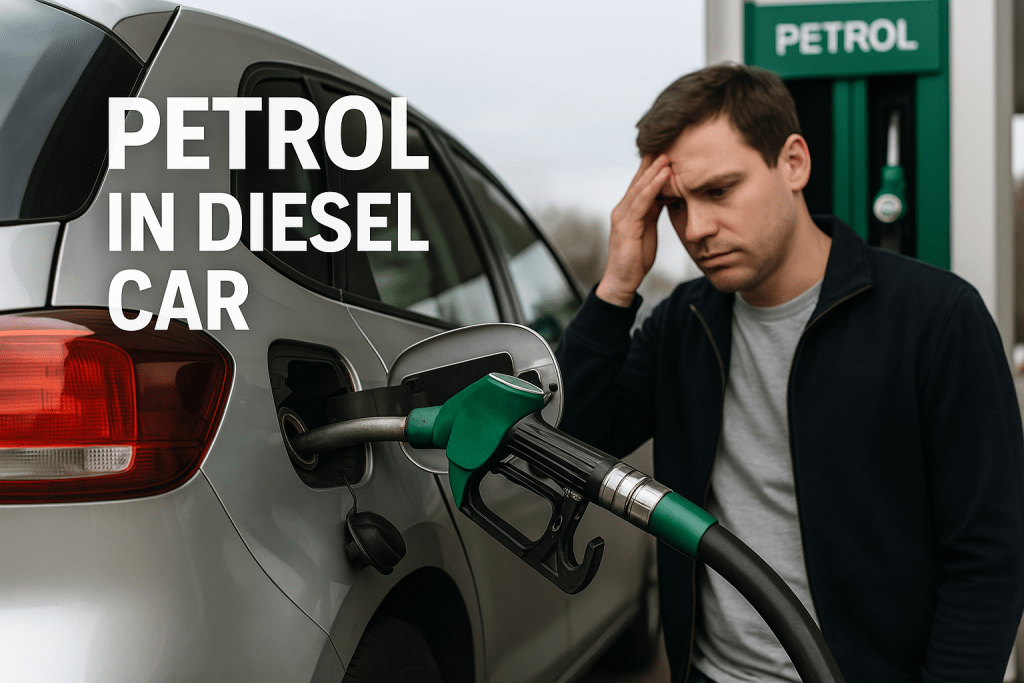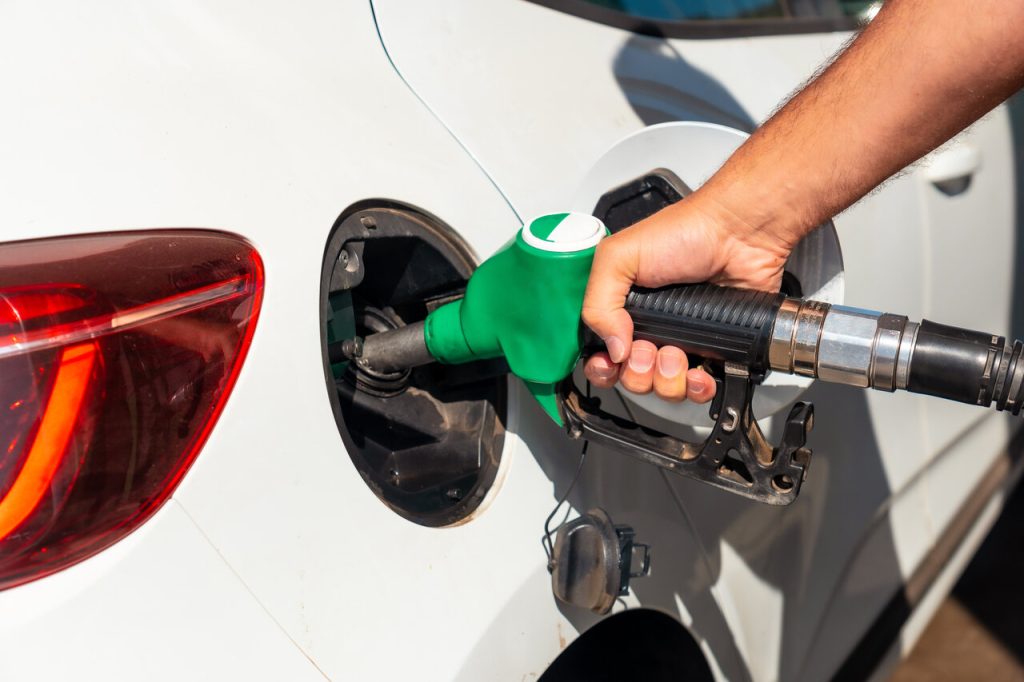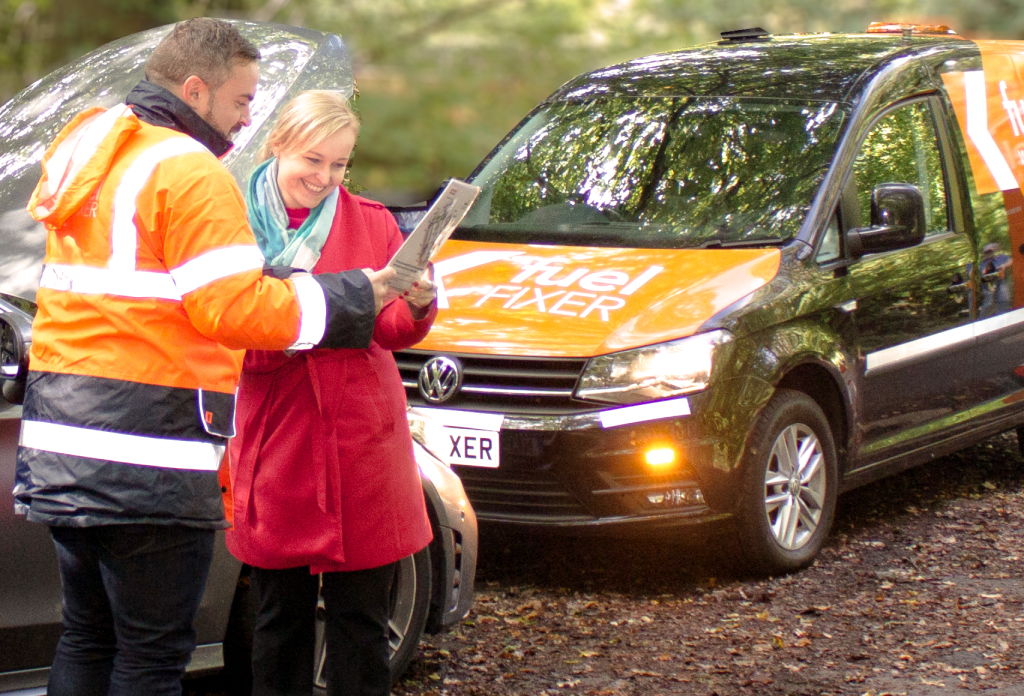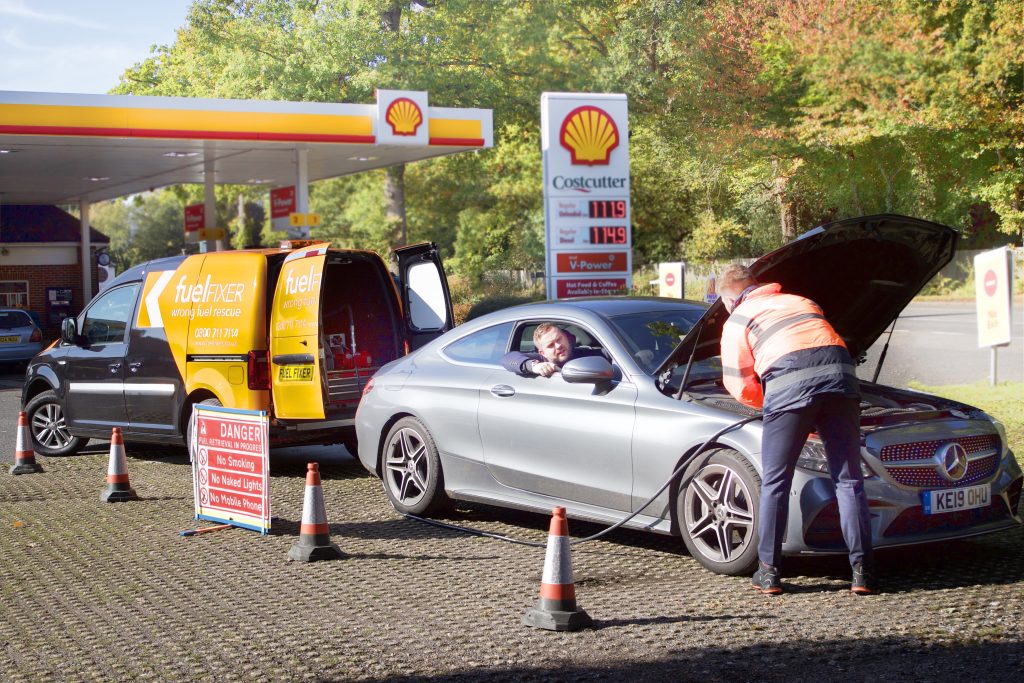What To Do If You Put Petrol in Diesel Car
Putting petrol in diesel is one of the most common misfuelling mistakes in the UK. If you realise your mistake:

- Do not start the engine.
- If you’ve already started or driven, pull over safely and switch off immediately.
- Call Fuel Fixer at 0333 366 1081. Our mobile units can usually reach you in under an hour.
Note: We fix this exact issue for hundreds of drivers every month. You’re not alone.

Symptoms of Petrol in a Diesel Car
Difficulty starting or stalling
- Loud knocking sounds
- Excessive exhaust smoke
- Loss of power
Driving a diesel car with petrol in the tank can cause serious damage to fuel pumps, injectors, and the engine. Acting fast can prevent costly repairs.
What If You Only Added a Small Amount?
Even a few litres of petrol can reduce diesel’s lubricating properties and harm your engine. A “small amount” still contaminates the system—and driving after misfuelling, even briefly, can worsen the damage.
Don’t guess. Call us for expert advice and wrong fuel rescue.

How We Fix It
- On-site fuel drain (petrol removed from diesel system)
- Full system flush
- Safety and diagnostic checks
- Fast nationwide response (avg. 46 mins)
- 24/7 availability
What happens when you put petrol in a diesel car? Diesel is quite thicker and oily as compared to petrol. That said, you’d be relieved to learn that filing your petrol car with diesel doesn’t usually cause much serious damage to your vehicle.
Diesel is compressed to be ignited, however, petrol can ignite with a single spark from the car’s spark plugs. As such, the first thing that gets damaged is the vehicle’s fuel filter. It’ll clog up quickly, while will then make your car halt and stall.
Next, your spark plugs will get affected, which will cause your car to lose power, emit lots of smoke before it stops running completely. Once you’ve removed the wrong fuel from the system, your car or bike starts running quickly. You may notice some smoke initially as the diesel residue gets burned off. Once it passes, your vehicle will start running as before.
Here are a few signs to look out for to determine if you’ve filled your petrol car tank with diesel:

The following steps can help you in preventing putting petrol in a diesel car mishaps:
- If you’ve bought a new car with a new engine, leave reminders or prompts in the vehicle to minimize the likelihood of misfuelling.
- Avoid any distractions as much as possible when you pull into a petrol station. Keep your phone aside and give full attention to the task.
- When filling up your fuel tank, don’t depend on the nozzle’s colour, the same goes for the hose colour. Make sure you read the pumps fuel grade indicator and trigger label.
Whenever you’re filling your fuel tank, you must take proper precautionary measures. By keeping your focus on the task, you’ll be able to avoid misfuelling, thereby saving you a lot of money.
However, if you have already filled your fuel tank incorrectly and started experiencing the symptoms mentioned earlier, please contact us at 0333 366 1081 and our experienced mobile specialists will safely remove the wrong fuel, make the required adjustments and help you get back on the road as quickly as possible.
We’re the country’s leading mobile misfuel service, and as such, various roadside assistance companies consult our engineers. We are available 24/7 and we have our units across several parts of the country, we can get to you anytime and anywhere.
There’s a Fuel Fixer mobile unit near you
We have local Fuel Fixer units with trained technicians in most major towns and can usually get to you within 46 minutes (average arrival time). We fix the problem on the spot, while you wait.
Did you put petrol in a diesel car? It is common today that people accidentally put petrol in a diesel car. So don’t worry about it. With 15 years of experience we will get you back in the road.
Does Your Insurance Cover Fuel Drain Cost?
While some insurers do cover the fuel drain cost, others don’t. however, some drivers choose to pay for the fuel drain service directly. We recommend you to contact your insurers directly. Either way, at Fuel Fixer, we’ll offer you a comprehensive VAT invoice for all the work carried out.
Petrol in Diesel Car
When it comes to filling up, it’s so easy to put the wrong fuel in car. Most people are used to owning a petrol car. However, if you recently got a diesel, you could accidentally use the wrong fuel and put petrol in instead. When you do that, you wonder what happens when you put petrol in the diesel vehicle. We’re going to help you understand what could occur.
It’s our goal to help you prevent yourself from putting the wrong fuel in, but if it does happen, we can help you remove it and protect your car.